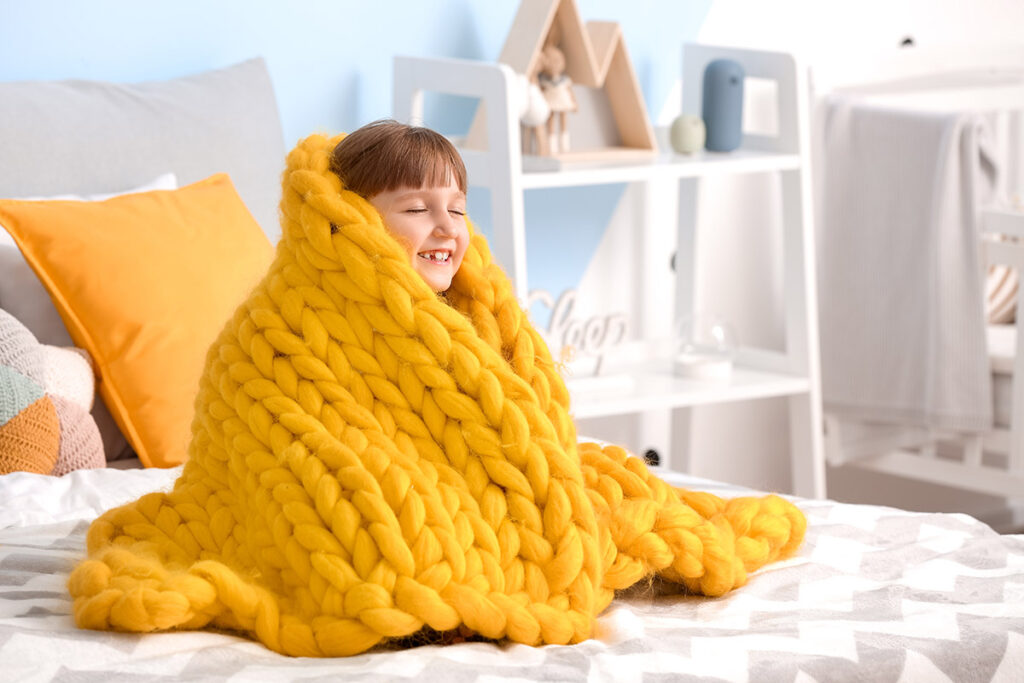
The Benefits of Weighted Blankets
Health and wellness trends come and go faster than you can say “health and wellness.” They can be quirky and gimmicky, and they typically have us scratching our heads wondering why we tried them in the first place. But others are here to stay and may have benefits that positively impact our health.
Up to this point, you may have heard of weighted blankets. Maybe your next-door neighbor has one or your friend’s millennial daughter proclaims she can’t live without hers. But what exactly is a weighted blanket, and is it worth the investment, storage and, frankly, getting our hopes up that it will work?
What Is a Weighted Blanket?
Weighted blankets are therapeutic blankets filled with small plastic pellets or beads that result in the blanket being heavier than what you may normally be used to. They come in various shapes, sizes and weights depending on the needs of the individual and are said to have numerous health benefits—from stress relief to improved sleep.
Weighted blankets first made their appearance in 1999, when Tina Champagne, an occupational therapist, began researching their effects within the special needs community. From there, the blankets slowly increased in popularity, eventually expanding into
households globally.
So, what makes a weighted blanket different from our favorite blanket at home that we also may reach for in times of stress? The secret is the added weight, which essentially may put our autonomic nervous system—the system that controls our basic bodily functions like breathing, digesting and sweating—into rest mode. Therefore, in situations of nervousness and anxiety, when our breathing increases and our heart beats faster, the actual weight of the blanket works to slow down our nervous system and restore a sense of calm.
This is effective beyond minimizing stress and anxiety. A weighted blanket may also be helpful for people with sleeping disorders. Do you toss and turn throughout the night? A weighted blanket may be worth looking into. The pressure they provide prepares your body for rest by slowing down your heart rate and breathing and may allow you to get the R&R that you so desperately need. (If you need more tips for a good night’s sleep, see here!)
Additionally, the benefits may positively impact those with other health conditions. For individuals with autism, particularly children, sleep deprivation can be a common characteristic. A small 2021 study performed by Swedish researchers investigated the impact of weighted blankets on children and adults with autism spectrum disorder. The participants included 48 children and 37 adults who found that they felt calmer and less anxious when a weighted blanket was used for sleeping the night prior.

Those suffering from chronic pain or depression or those diagnosed with attention deficit disorder (ADHD) may also reap the rewards of a weighted blanket, as it may serve as a quick fix in moments of stress. You know the feeling when someone gives you a big, thoughtful hug? Weighted blankets work in the same way, engulfing us and putting our nerves to rest, as the pressure from the blanket serves to slow our nervous system and lower our heart rate. Although the pros of a weighted blanket may greatly improve the mental, emotional or physical conditions of some, the benefits really expand to just about anyone who may need an added sense of calm and relief in their day.
Are There Any Cons to Weighted Blankets?
While the risks may be low, it is important to find a blanket that is not heavier than what you need. Something too heavy may result in discomfort and even injury. Children under the age of 2 should not use weighted blankets, as they may increase the risk of suffocation. If you want to use a weighted blanket for a child, ask your pediatrician first. Weighted blankets also may be unsuitable for people with certain medical conditions, such as claustrophobia, obstructed sleep apnea and asthma.
As a clinician, I recommend weighted blankets for those with symptoms of anxiety. There is a sense of comfort with the extra weight making one feel secure. I use my weighted blanket mainly in the winter as a source of comfort and also to keep me warm.
Rebecca Sultan, MA, LMFT, LCADC – Manager of EAP Services
Choosing the Right Weighted Blanket
When choosing a blanket, the weight should be between 5% and 10% of your body weight for optimal results. You want something large enough to cover you fully as well. No one likes their feet to be left out, right? There are various brands that make these blankets, and the fabric, color, material and, of course, weights all range as well.
While there are a lot of options, don’t let them weigh you down; it really is just about what may suit you and your health best.






















